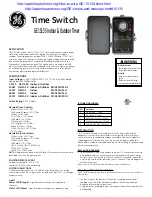
3. Using the appropriate drill bit size, drill the pilot holes (Note that if drilling
into wood or metal a specialized drill bit may be needed.)
See Drill Diagram.
4. For sheetrock; use a hammer to gently tap the anchors into the pilot holes.
5. Place the box up to the pilot holes or anchors and insert the screws
accordingly.
Wiring the Device to the Timer
NOTE - For outdoor installation (model GE15087), rain tight or wet location
conduit hubs that comply with requirements of UL 514B (standard for fittings
for conduit and outlet boxes) must be used.
1. Remove 2 screws retaining the interior cover panel and remove the panel.
2. Refer to Figure 1 and wiring diagrams to determine appropriate placement
of wires. It is the responsibility of the installer to ensure that all applicable
National and Local code requirements are met. If you are unsure of these
requirements, contact a licensed electrician immediately.
Please refer to Quick Start Guide for Examples and More Details.
3. GROUNDING: This enclosure is of plastic construction and does not require
a ground connection. This enclosure does not provide grounding between
conduits. When using non-metallic conduit or cable, connect the ground
wires of all cables together with the provided wire nut. When metallic
conduit is used; as the grounding connection, use grounding type bushing
and a jumper wire between each conduit.
Dipswitch Configuration
WARNING: Failure to properly configure the dipswitch will result in damage
to the unit and void any warranty! Before installing and wiring the GE Time
Switch, proper configuration must be selected. Unit is shipped with DIP
Switches set for 277VAC Input Voltage. Also, do not check circuits by “sparking”
wires to terminals. Damage to timer may result.
4. Determine the input voltage which will be applied to the timer. (120V AC,
208-240V AC, or 277V AC)
5. Set the DIP Switch according to the diagram below:
6. Reinstall interior cover panel. Opposite of step 1.
OPERATING INSTRUCTIONS:
When the Time Switch is installed and power applied, the timer’s dial will turn
clockwise maintaining time. The pointer on the face of the dial points to the
current time
1.
Locate the segments around on the outer edge of the timer’s dial. These
segments, each representing 30 minutes, can be pushed down and away
from the edge of the dial (try using the tip of a pen or pencil). Conversely,
segments that have been pushed down can be easily pushed back up by
hand. Be sure all segments are pushed up before programming. Select a
time period (or periods) you want the device turned on, then push down
ALL the segments that fall on or within that time period. For example,
to have the timer turn a device on at 10PM and off at 2AM, push down
the segments representing 10PM and 2AM, and ALL the segments in
between. You may need to turn the dial clockwise to access the desired
segments.
2.
Rotate the timer’s dial clockwise until the pointer on the face of the dial
points to the current time of day. Note: Nighttime hours (from 6:30 PM to
6:30 AM) are highlighted with a grey background.
3.
Set master switch to the TIMER position.
4.
To override timer program and control output load manually:
• set master switch to OFF (center position) to turn load OFF
• set master switch to ON (bottom position) to turn load ON
5.
This is a Timer Control and should not be used for power disconnect.
Turn power off at main panel before servicing this switch or the
equipment it controls.
In case of power failure, reset the time of day as explained in step 2.
PRESSURE PLATE
TERMINAL SCREW
MAKE SURE WIRE
INSULATION CLEARS
PRESSURE PLATE
14
12
10
8
15
20
30
40
60
60
60
105
MINIMUM COPPER
WIRE SIZE (AWG)
MAX. LOAD (AMP)
MIN. INSULATION
TEMP(°C)
Shows timer set to turn device
ON at 10 PM and OFF at 2 AM.
Notice ALL segments between
10 PM and 2 AM have been
pushed out. Current time is 9:00 PM.
Timer Dial
Soft Wood
5/64”
Material
Drill Bit Size
Drill Diagram
Hard Wood
3/32”
Metal
5/64”
Sheetrock
3/16”
No
Anchors Needed?
No
No
Yes
15087
15207
56922
Manual Version 2
11-24-2009
www.jascoproducts.com
4
3
2
1
ON
ON
ON
ON
120VAC
4
3
2
1
OFF
OFF
OFF
OFF
277VAC (Default)
4
3
2
1
OFF
ON
ON
OFF
208~240VAC
Figure 1


